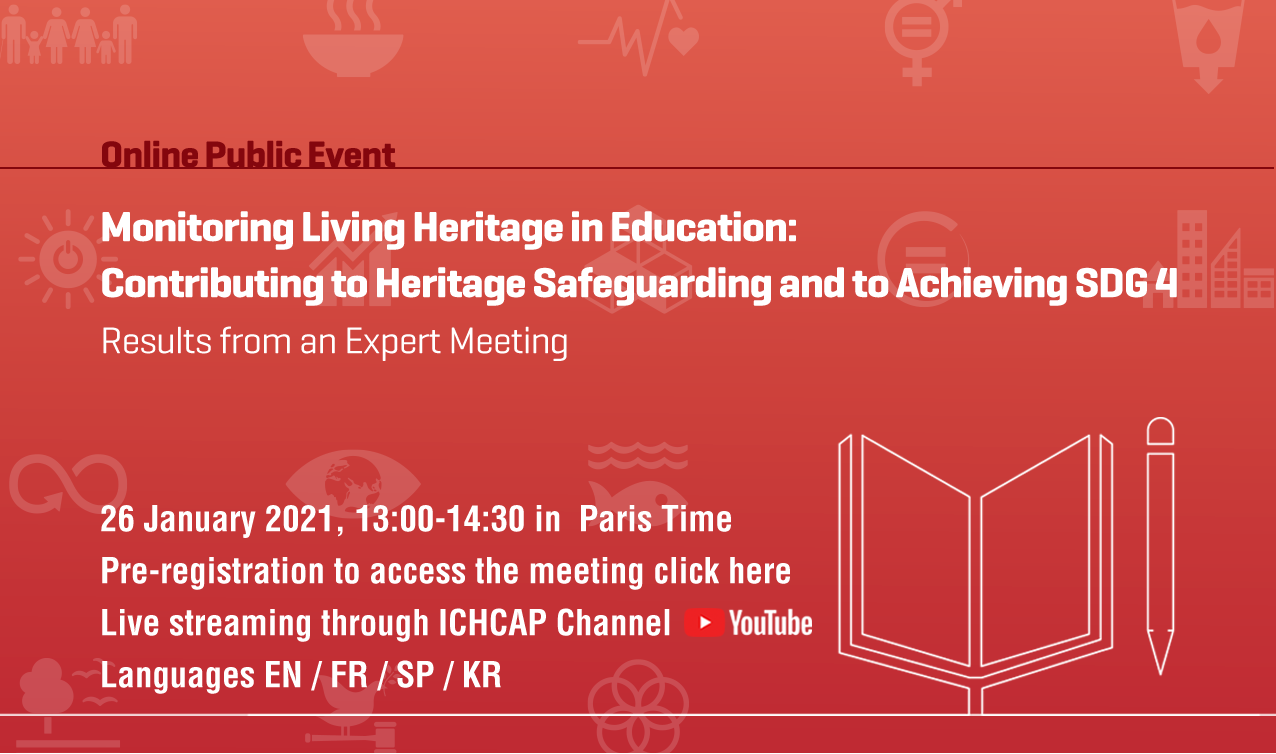Project Description
Online Public Event
Monitoring Living Heritage in Education:
Contributing to Heritage Safeguarding and to Achieving SDG 4

Introduction
This event is organized with the aim to raise awareness for the benefits and challenges of monitoring living heritage in education by sharing the results from the previous online expert meeting on ‘Education-related indicators in the Overall Results Framework for the 2003 Convention for the Safeguarding of the Intangible Cultural Heritage and their relationship with SDG4’.
The intersectoral expert meeting that was held in three sessions in December 2020 was a platform for international experts in the field of culture and education from across the world to deepen the understanding of the education-related indicators and demonstrate more clearly the linkages this has with the reporting on the progress towards quality education for sustainable development and peace. It generated important knowledge on the interface between living heritage and education, identified examples to illustrate this relationship and provided advice for future monitoring and reporting in these related fields. The webinar welcomes all governmental and non-governmental stakeholders interested in culture and education to join this debate on monitoring living heritage in education.
| Date & time | 26 January 2021, 13:00 – 14:30 (Paris Time) |
| Location | Online |
| Languages | English, French, Spanish, Korean |
| Convener | UNESCO Living Heritage Entity, Culture Sector in collaboration with the Division for Peace and Sustainable Development of the Education Sector |
| Host | The International Information and Networking Centre for Intangible Cultural Heritage in the Asia-Pacific Region under the Auspices of UNESCO (ICHCAP). |
| Sponsor | The Cultural Heritage Administration of the Republic of Korea (CHA). |
| Objective | Raise awareness for the benefits and challenges of monitoring living heritage in education by sharing results and examples from an expert meeting on education-related indicators in the Overall results framework for the 2003 Convention for the Safeguarding of the Intangible Cultural Heritage and their relation to the indicators of Sustainable Development Goal 4 (SDG 4). |
| Description | The Convention for the Safeguarding of the Intangible Cultural Heritage was adopted by UNESCO in 2003 with the primary purpose of ensuring the viability of this significant heritage. Intangible cultural heritage – or living heritage – refers to the knowledge, practices, and expressions that are passed on from generation to generation, in families and communities everywhere around the world. Inter-generational transmission as a creative, dynamic, interactive process is essential for ensuring that this living heritage is constantly recreated and passed on from one generation to the next. Education can play a valuable role in safeguarding intangible cultural heritage. This is the reason why the 2003 Convention for the Safeguarding of the Intangible Cultural Heritage includes a reference to ‘transmission, particularly through formal and non-formal education, as part of the proposed safeguarding measures (Article 2.3). Accordingly, the overall results framework for the 2003 Convention (available since 2018) includes as one of eight thematic areas ‘transmission of intangible cultural heritage and education. While a better understanding of the role of intangible cultural heritage and its importance in achieving SDG 4, in particular target 4.7, has emerged, reporting against the specific education-related indicators of the overall results framework of the Convention remains challenging for stakeholders from both the culture and education fields. The linkages to demonstrate more clearly how this reporting can inform the monitoring system on SDG 4 have not yet been explored either. Therefore, UNESCO organized, in collaboration with ICHCAP an intersectoral online expert meeting on ‘Education-related indicators in the Overall results framework (ORF) for the Convention for the Safeguarding of the Intangible Cultural Heritage and their relationship with SDG 4. This online meeting, held in three sessions in December 2020, generated important knowledge on the interface between living heritage and education, identified examples to illustrate the relationship, and provided advice for future monitoring and reporting in these related fields. The public webinar aims to raise awareness for the benefits and challenges of monitoring living heritage in education by sharing the results of the above-mentioned intersectoral expert meeting. It will include a brief presentation on the education-related indicators of the ORF and how they can inform the monitoring system of SDG 4. Speakers will be invited to share their experiences and discuss the benefits of this intersectoral monitoring to inspire relevant stakeholders from the education and culture fields to undertake their own initiatives in this innovative intersectoral field. The event will include a question and answer session with the audience. |
| Audience | Governmental and non-governmental stakeholders with an interest in education and culture. |
